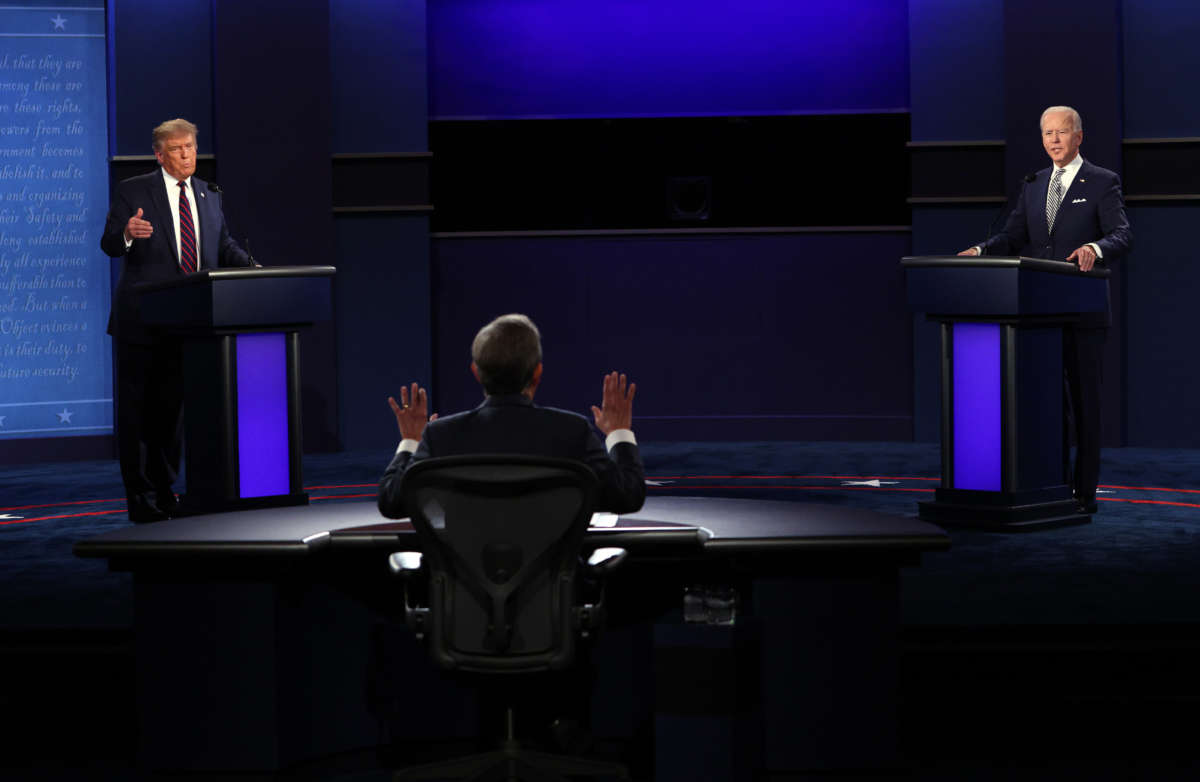The Commission on Presidential Debates (CPD) announced on Monday that it would mute the microphones of both candidates for portions of Thursday night’s debate between President Donald Trump and former Vice President Joe Biden — a move that Trump has described as “unfair,” even though it will be applied to both candidates equally.
Under the new rules, each candidate will have their microphone cut off during the initial two-minute answer period to allow their opponent to answer a question uninterrupted on each of the six topics that will be discussed during the debate. Following the initial responses, the mics will be turned back on for both candidates to allow a direct conversation between them.
“Both campaigns this week again reaffirmed their agreement to the two-minute, uninterrupted rule,” the CPD said in a statement. “The Commission is announcing today that in order to enforce this agreed upon rule, the only candidate whose microphone will be open during these two-minute periods is the candidate who has the floor under the rules.”
Recognizing that neither campaign may be completely satisfied with the rule changes, the CPD noted:
“One may think they go too far, and one may think they do not go far enough. We are comfortable that these actions strike the right balance and that they are in the interest of the American people, for whom these debates are held.”
The rules change appeared to be in response to criticisms of the first debate between the two candidates, which took place in late September. During that event, Trump constantly interrupted Biden, speaking over his opponent at least 71 times (versus Biden interrupting him just 22 times). Trump also repeatedly interrupted the moderator, Chris Wallace, frequently not letting him finish a question.
While some interruption during a debate is unavoidable, reviews of the first debate were largely negative, with a number of observers expressing displeasure at Trump’s loutish and unpresidential behavior and his constant talking out of turn.
The following day, the CPD said in a statement that the first debate “made clear that additional structure should be added to the format of the remaining debates to ensure a more orderly discussion of the issues.” Their announcement on Monday of the new rules appears to be an attempt to avoid a repeat of the fiasco that occurred at the first debate in September.
President Trump, speaking to reporters on Air Force One regarding the changes for Thursday night’s debate, expressed misgivings but did not indicate he would drop out of the event like he did last week, when format changes were announced for what would have been the second debate between the candidates.
“I’ll participate. I just think it’s very unfair,” he said.
Trump campaign manager Bill Stepien also decried the rule change as “completely unacceptable,” adding that it was wrong to have the possibility of an “unnamed” person muting the mics.
Stepien’s complaints went further. In a two-page letter to the debate commission, he denounced the topics of the debate itself that were announced late last week and suggested that the debate should focus solely on foreign policy matters.
“As is long standing custom, and as had been promised by the Commission on Presidential Debates, we had expected that foreign policy would be the central focus of the October 22 debate,” Stepien wrote. “We urge you to recalibrate the topics and return to subjects which had already been confirmed.”
The Biden campaign disputed Stepien’s letter, noting that foreign policy was never promised as the theme of the final debate.
“The Trump campaign is lying about that now because Donald Trump is afraid to face more questions about his disastrous COVID response,” TJ Ducklo, a Biden campaign spokesperson, said.
Indeed, press materials from the CPD published in early September on the formats for all three planned debates, there is no indication that the final debate would have its prime focus on foreign policy matters. All that is said about the third debate, within that document, is that it “will be identical to the first presidential debate” — that is, six segments of approximately 15 minutes each, with “major topics to be selected by the moderator and announced at least one week before the debate.”
National security, which encompasses some aspects of foreign policy, will be one of the six topics of Thursday night’s debate. The other five topics will be COVID-19, American families, race in the U.S., climate change and leadership.
The debate is set to take place on Thursday evening at 9 pm Eastern Time.
48 Hours Left: All gifts to Truthout now matched!
From now until the end of the year, all donations to Truthout will be matched dollar for dollar up to $28,000! Thanks to a generous supporter, your one-time gift today will be matched immediately. As well, your monthly donation will be matched for the whole first year, doubling your impact.
We have just 48 hours left to raise $28,000 and receive the full match.
This matching gift comes at a critical time. As Trump attempts to silence dissenting voices and oppositional nonprofits, reader support is our best defense against the right-wing agenda.
Help Truthout confront Trump’s fascism in 2026, and have your donation matched now!
